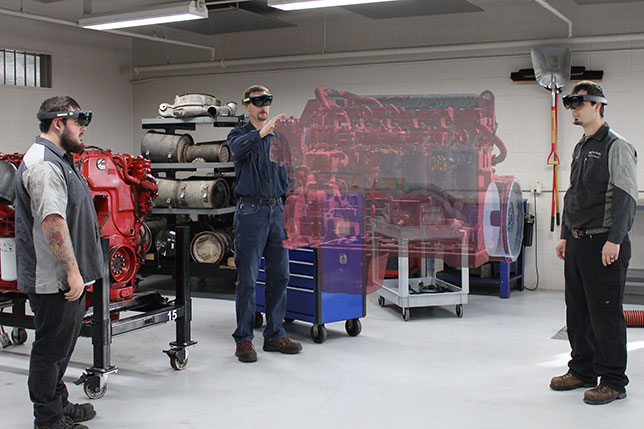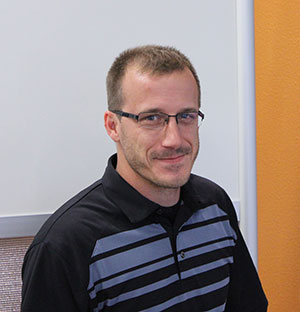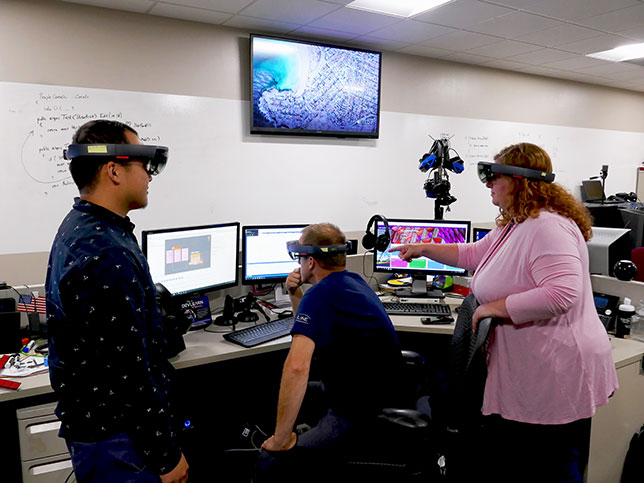Bringing Career Skills to Life in VR
At Fox Valley Technical College, students are using virtual reality to safely explore the inner workings of a diesel engine — while it is running.
Category: Teaching and Learning
Institution: Fox Valley Technical College
Project: HoloDiesel
Project lead: Josh Janikowski, applications developer
Tech lineup: Autodesk, Microsoft, Unity

HoloDiesel
When Jay Duca, a diesel equipment instructor at Fox Valley Technical College in Appleton, WI, attended an in-service presentation on Case Western Reserve University's (OH) HoloAnatomy for VR nursing instruction and 3D simulation, he immediately thought of his own diesel equipment students. He knew a similar virtual reality tool could help them understand how a 6-cylinder Cummins ISX works by opening up the running engine and seeing what's happening inside — virtually, of course.
The concepts of internal combustion are difficult for most students who enter the diesel technology program, and instructors struggle to describe the complex process that's taking place inside the closed engine housing. Inspired by Case's HoloAnatomy, Duca proposed a holographic image of a running Cummins engine that students could manipulate firsthand, giving voice commands to examine and interact with the crankshaft, pistons, valves, connecting rods and other operating components. Wearing a Microsoft HoloLens, students would be able to explore as they needed, in order to understand the engine.
That was back in 2017. Soon, FVTC had a team of developers, instructors and administrators at work on a "Diesel HoloLens" project, in a partnership between the diesel department and FVTC's Learning Innovations Department. That project was completed in 2018, and by 2019 it was dubbed "HoloDiesel" and included as an important part of the diesel technician curriculum at the college.

Project lead Josh Janikowski
HoloDiesel has brought many benefits to instruction at the college. One effect has been its popularity with students, who seem to be picking up on concepts more easily. Josh Janikowski, an applications developer at FVTC and project lead for HoloDiesel, commented on students' enthusiasm: "They don't want to stop working with it, even after class," he observed.
Students also speak highly of their experiences with HoloDiesel. "It's one thing to hear about what goes on inside an engine, but it's another thing to take it apart physically and see everything in motion work together," noted Ethan Schenkenberger, speaking as a student in FVTC's diesel program. "Everything is easier to understand."
Comments like these are backed up by studies of student performance, which shows improvement after using the HoloDiesel engine. Diesel program instructors have reported better quiz scores after students have had time with HoloDiesel.
Instructors also appreciate HoloDiesel's relevance to "real-world" skills that their students need to learn. Given the ability to interact with component parts directly in their virtual experience of the engine, students gain troubleshooting abilities. By providing this this new sense of familiarity with how the engine functions, HoloDiesel helps students begin to cross the bridge between theory and on-the-job, under-the-hood savvy.

FVTC developers created HoloDiesel in a collaborative effort between the college's diesel department and Learning Innovations Department.
For development considerations, Microsoft HoloLens was the instrument of choice because of its reputation for stability. FVTC developers then chose to build in Unity, mostly because it allows for cross-platform development and their team could work with tools they were already comfortable using. Another critical platform for the project was Autodesk Maya, used for 3D computer animation, modeling and rendering. And while the team considers developing a multi-player environment a challenge, they feel that the project is generally replicable by other institutions that can dedicate staffing resources, from instructors, to developers, to administrators or managers.
In the future, FVTC will continue to develop HoloDiesel, including additional components over time. They are also exploring ways to offer industry partners similar tools — for example, manufacturers who might benefit from the use of VR experiences for their employees or customers.
Clearly, FVTC can point to many great attributes and benefits of the HoloDiesel project. But Janikowski pinpointed its success easily: "The engine is positioned as a hologram, which makes learning brilliantly simple."
Return to Campus Technology Impact Awards Home
About the Author
Meg Lloyd is a Northern California-based freelance writer.